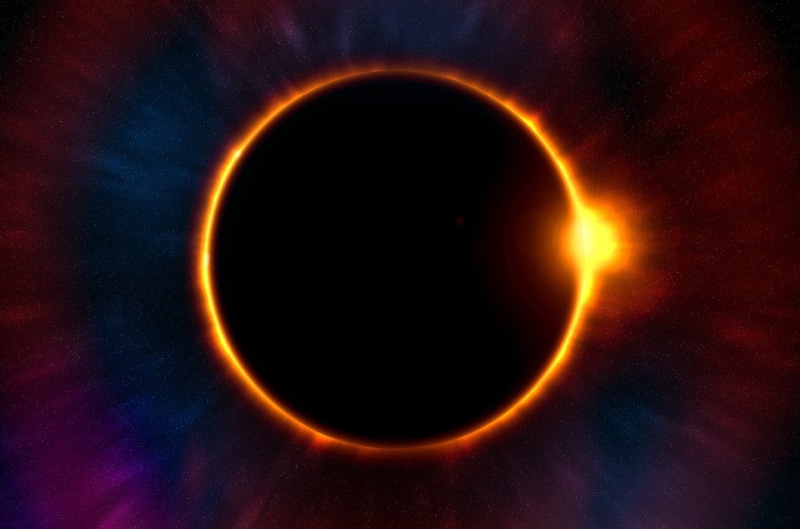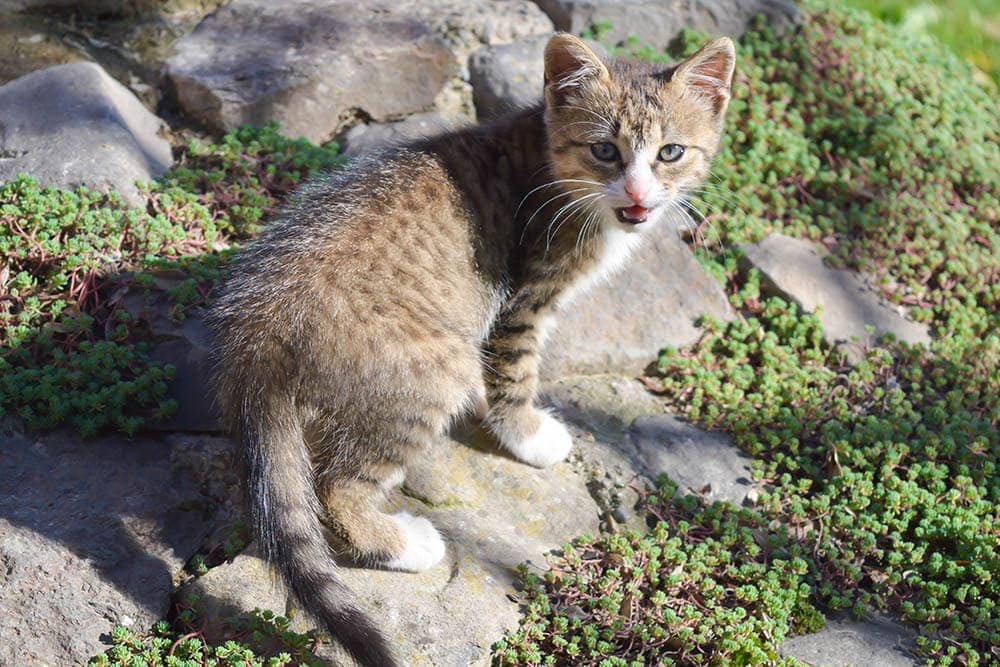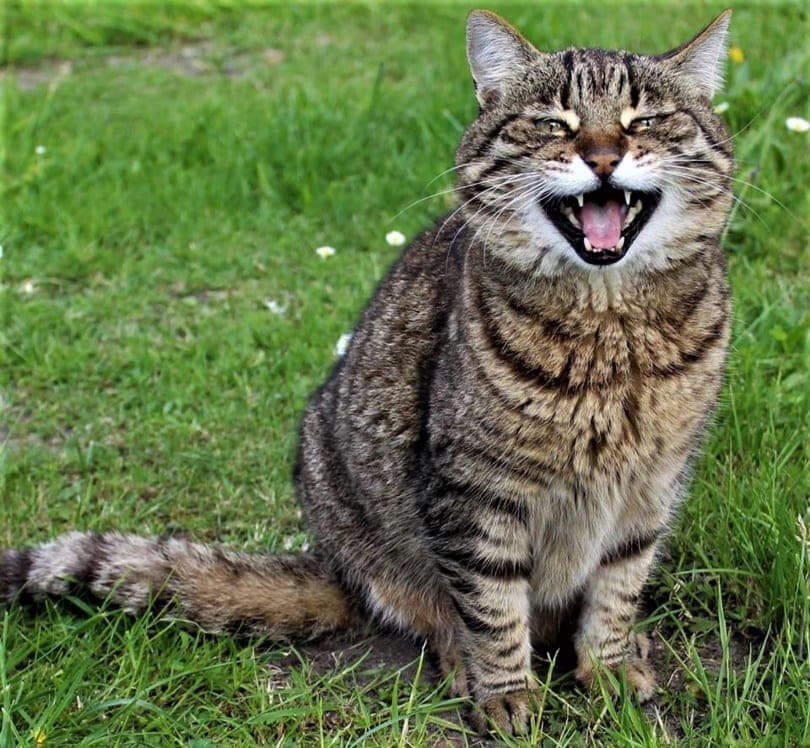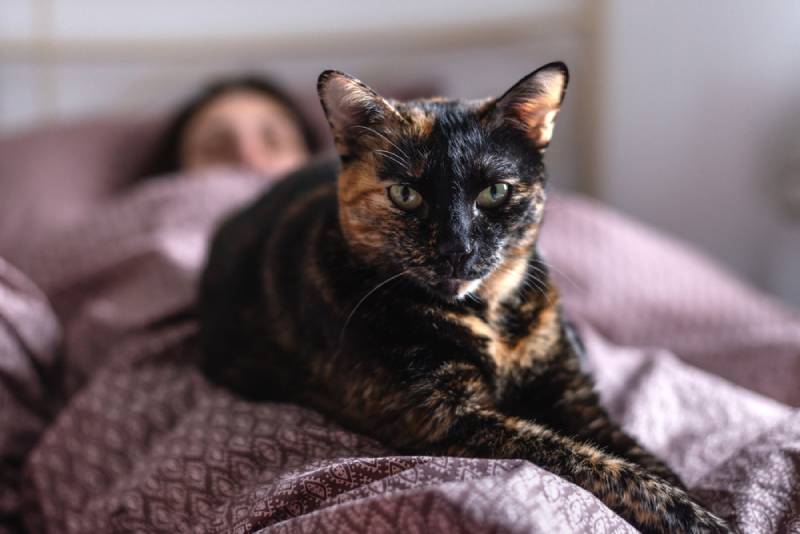How Does the Solar Eclipse Affect Pets? Animal Behaviour Explained

Updated on

In the grand theater of the cosmos, a solar eclipse is undoubtedly one of the most captivating acts. While we humans may marvel at this spectacle, ever wondered how our pets perceive it? Solar eclipses usually only have mild effects on pets. It may result in confusion and the animals being a little spooked. This comprehensive guide will delve into the effects of a solar eclipse on various animals, including dogs, cats, birds, and reptiles, and provide useful tips on how to keep your pets safe during these rare celestial events.
Understanding Solar Eclipses
A solar eclipse is a natural phenomenon that occurs when the moon aligns perfectly between Earth and the sun, temporarily blocking the Sun’s rays from reaching us. This event can only happen during a New moon phase.
There are three kinds of solar eclipses: total, partial, and annular. In a total solar eclipse, the moon entirely obscures the sun. A partial solar eclipse happens when only a portion of the sun is blocked. During an annular solar eclipse, the moon is too distant from Earth to cover the sun completely, resulting in a brilliant ring or ‘ring of fire’ around the moon.

Pets and Solar Eclipses
Dogs and Cats
Dogs and cats, being diurnal creatures, are accustomed to being active during daylight hours. The sudden darkness that comes with a solar eclipse can disorient them, causing a shift in their behavior. This might result in them preparing for sleep or turning more active, especially if they’re used to hunting at night.
Furthermore, the abrupt change in light and temperature could cause fear or anxiety in these animals. For example, some dogs may start to whine, pace, or show other signs of distress. Cats, on the other hand, may become more skittish and hide. In some cases, these pets might even exhibit confused behavior, such as looking for a place to sleep or searching for food, usually given at night.
Birds
Birds, particularly those species that are active during the day, can also be affected by a solar eclipse. The sudden onset of darkness can lead them to believe it’s nightfall. As a result, they might stop their daytime activities and begin their evening routines. This can include returning to their nests or roosting spots and starting their evening songs.
It’s not uncommon to hear reports of a sudden silence falling over areas populated by birds when a solar eclipse occurs, as many species cease their usual daytime calls. Then, as the eclipse reaches totality, nocturnal birds may begin their nighttime calls only to fall silent again once the eclipse ends and daylight returns.
Reptiles
Reptiles, being cold-blooded animals, depend heavily on external heat sources to regulate their body temperatures. Therefore, the temperature drop that accompanies a solar eclipse can significantly affect them.
They might become less active, mirroring their typical nighttime behavior. For instance, reptiles like lizards and snakes, which bask in the sun during the day, may retreat to their shelters.
Moreover, nocturnal reptiles may become more active, mistaking the temporary darkness for their usual active hours. After the eclipse, these reptiles may appear confused or disoriented as the daylight and warmth return abruptly.
It’s clear that a solar eclipse can have varied effects on different species. The change in light and temperature conditions can trigger unusual behaviors as animals attempt to adapt to what they perceive as an unexpected transition from day to night.
Farm Animals
A solar eclipse can significantly impact the behavior of farm animals, much like it does with other wildlife. The sudden onset of darkness can disorient these animals and trigger behaviors typically associated with nighttime.
- Cattle: Cows may become confused and start to head towards their barns or shelters, mistaking the eclipse for nightfall. Some might stop grazing and stand still until daylight returns.
- Poultry: Chickens and other poultry species may react to the eclipse as if it were night. They could return to their roosts or nests and settle down until the sun reappears.
- Rabbits: Rabbits may also become disoriented and frightened by the darkness. They may hunker down in their burrows or hide in the shadows, not emerging until after the eclipse is over.
- Horses: Horses might also be affected by the sudden change in lighting conditions. They could become nervous or anxious, displaying signs of restlessness.
- Pigs: Pigs, particularly those that are free-ranging, may retreat to their sleeping areas during the eclipse, only to resume their normal activities once daylight returns.
- Sheep and Goats: These animals might also exhibit changes in behavior, such as clustering together or returning to their shelters.
- Bees and Other Insects: A solar eclipse can affect insects found on farms too. Bees may return to their hives and mosquitoes and midges may become more active, as they often do at dusk.
It’s important to note that reactions can vary widely among different animals and even among individuals within the same species. While some animals might become anxious or fearful, others may not react at all.

Can Solar Eclipses Harm Pets’ Eyes?
Just like humans can harm their eyes by looking directly at the sun during an eclipse, pets too can suffer retinal burns if they stare at the sun. However, this risk is relatively low because animals do not have the instinct to look up at the sky.
Safeguarding Your Pets During a Solar Eclipse
While the behavior of pets during a solar eclipse can vary, there are measures you can take to ensure their safety and comfort:
- Keep pets indoors: By keeping your pets inside during the eclipse, you can prevent potential eye damage and reduce any anxiety caused by the sudden onset of darkness.
- Provide a comfortable space: If your pet shows signs of stress or fear, make sure they have a quiet, dark, and comfortable place where they can retreat.
- Maintain their routine: To avoid causing extra stress, try to keep your pet’s routine as regular as possible. Feed and walk them at their usual times.
- Comfort them: If your pet appears anxious, spend time comforting them. Your presence can reassure them and help them stay calm.
- Use familiar sounds: Pets often find comfort in familiar sounds. Consider leaving on some soft music or the TV during the eclipse to help mask any unusual outdoor noises that might be associated with the event.
- Avoid direct exposure: If you have an outdoor pet, try to reschedule their outdoor activities during the eclipse. This will prevent them from looking directly at the sun and experiencing potential eye damage.
- Provide toys and distractions: Keeping your pets distracted can help reduce their anxiety. Provide them with their favorite toys or introduce new ones during the eclipse to keep their attention.
- Consult your veterinarian: If your pet is generally anxious or has reacted negatively to changes in the past, it may be worth discussing the upcoming eclipse with your vet. They can provide advice tailored specifically to your pet’s needs.
- Monitor their behavior: Keep a close eye on your pets during the eclipse. If they exhibit unusual behavior or seem particularly stressed, be ready to comfort them and provide extra care.
- Be patient: Your pets may act out or behave unusually during the eclipse. Remember, they don’t understand what’s happening. Be patient with them, provide lots of love and reassurance, and they should return to normal behavior once the eclipse is over.

Wrapping It Up
While solar eclipses are enthralling phenomena for us, they can affect our pets in diverse ways. Though most pets are unlikely to have adverse reactions, it’s crucial to observe them during these events and take necessary precautions to ensure their safety and well-being. By understanding and catering to your pet’s needs, you can effectively safeguard them during rare astronomical events such as a solar eclipse.
Featured Image Credit: ipicgr, Pixabay










